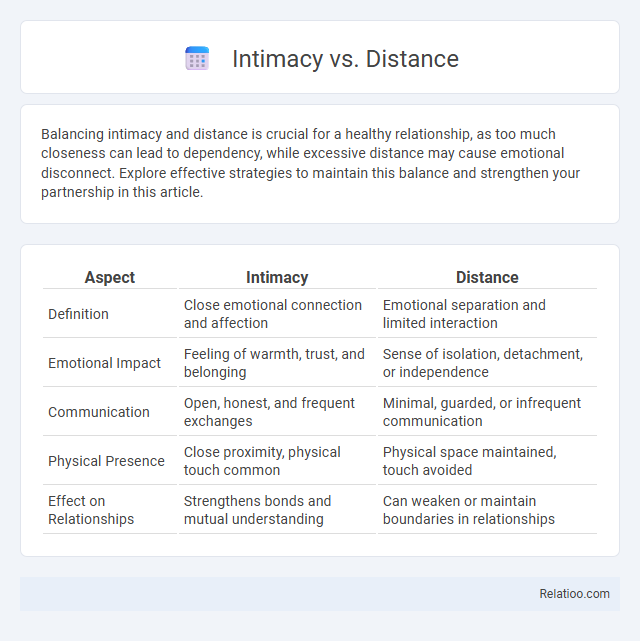Balancing intimacy and distance is crucial for a healthy relationship, as too much closeness can lead to dependency, while excessive distance may cause emotional disconnect. Explore effective strategies to maintain this balance and strengthen your partnership in this article.
Table of Comparison
| Aspect | Intimacy | Distance |
|---|---|---|
| Definition | Close emotional connection and affection | Emotional separation and limited interaction |
| Emotional Impact | Feeling of warmth, trust, and belonging | Sense of isolation, detachment, or independence |
| Communication | Open, honest, and frequent exchanges | Minimal, guarded, or infrequent communication |
| Physical Presence | Close proximity, physical touch common | Physical space maintained, touch avoided |
| Effect on Relationships | Strengthens bonds and mutual understanding | Can weaken or maintain boundaries in relationships |
Understanding Intimacy vs Distance
Understanding intimacy versus distance is crucial for building meaningful relationships, as intimacy involves emotional closeness and vulnerability while distance creates protective boundaries. Your ability to balance these dynamics affects trustworthiness, fostering connections where both parties feel safe and valued. Maintaining appropriate distance can prevent emotional burnout and enhance the quality of intimacy in personal or professional interactions.
The Psychology Behind Emotional Closeness
Emotional closeness is deeply influenced by the balance between intimacy, distance, and trustworthiness, where intimacy fosters vulnerability and connection, distance provides necessary personal boundaries, and trustworthiness ensures safety and reliability in relationships. Psychological research highlights that secure attachment styles emerge when individuals feel understood and respected within these dynamics, promoting healthier interpersonal bonds. Neural mechanisms involving oxytocin and the prefrontal cortex play crucial roles in regulating emotions and reinforcing trust, which underpin emotional intimacy and resilience.
Factors Influencing Personal Boundaries
Personal boundaries are shaped by various factors including cultural background, past experiences, and individual personality traits, which influence your comfort with intimacy, distance, and trustworthiness. Emotional safety, communication styles, and mutual respect play crucial roles in establishing and maintaining these boundaries. Understanding these elements helps you navigate relationships while protecting your well-being and fostering healthy connections.
Benefits of Intimacy in Relationships
Intimacy in relationships fosters deep emotional connection, enhancing your sense of security and mutual understanding. It promotes vulnerability, which strengthens trustworthiness by encouraging honest communication and empathy. By nurturing intimacy, couples build a resilient bond that supports long-term satisfaction and emotional well-being.
The Role of Distance in Personal Growth
Distance plays a crucial role in personal growth by allowing individuals to develop self-awareness and emotional resilience outside of constant intimacy. Maintaining healthy boundaries through physical or emotional distance fosters trustworthiness by promoting independence and reducing codependency. Strategic distance enables clearer self-reflection, which enhances interpersonal relationships and strengthens long-term trust.
Signs of Unhealthy Emotional Distance
Unhealthy emotional distance may manifest through consistent withdrawal, lack of communication, and avoidance of vulnerability, undermining the foundation of intimacy and trustworthiness in your relationships. Signs include cold interactions, reluctance to share thoughts or feelings, and emotional unavailability, which erode emotional connection. Recognizing these patterns early helps protect your emotional well-being and fosters healthier, more connected relationships.
Navigating Vulnerability and Trust
Navigating vulnerability requires balancing intimacy and distance to build trustworthiness in relationships. Establishing clear boundaries while maintaining open communication fosters a safe environment where partners feel seen and respected. Consistent honesty and empathy strengthen trust, enabling deeper emotional connections and resilience through challenges.
Finding the Balance: Healthy Intimacy Levels
Finding the balance between intimacy, distance, and trustworthiness is crucial for maintaining healthy relationships. Your ability to establish appropriate boundaries fosters mutual respect while allowing emotional closeness to develop naturally. Trustworthiness underpins this balance, creating a safe environment where vulnerability and connection flourish without compromising personal space.
Communication Strategies for Connection
Effective communication strategies for intimacy, distance, and trustworthiness involve active listening, clear expression of emotions, and consistent honesty. Establishing boundaries while maintaining empathy fosters a balanced connection that respects personal space yet encourages openness. Trustworthiness is reinforced through reliability in words and actions, creating a safe environment for vulnerability and deeper relational bonds.
Building Stronger Bonds Through Mutual Respect
Building stronger bonds through mutual respect requires balancing intimacy, distance, and trustworthiness in relationships. Intimacy fosters emotional connection and vulnerability, while appropriate distance maintains individual autonomy and boundaries. Trustworthiness acts as the foundation, ensuring both partners feel safe and respected, ultimately enhancing mutual understanding and cooperation.

Infographic: Intimacy vs Distance
 relatioo.com
relatioo.com